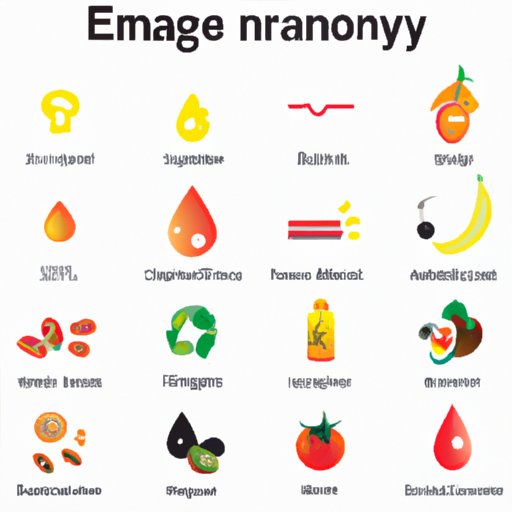
I. Introduction
Do you often feel sluggish and exhausted, even after a good night’s sleep? You’re not alone. Many people struggle with low energy levels, which can affect mood, productivity, and overall quality of life. While there can be many reasons for feeling tired, one common issue is a lack of essential vitamins and nutrients. Maintaining a healthy balanced diet is crucial for overall health, and certain vitamins can help address feelings of fatigue and boost energy levels.
II. Top 5 Vitamins for Natural Energy Boosting
There are many vitamins and nutrients that play a role in maintaining energy levels, but these five are particularly important:
- Vitamin B12
- Vitamin C
- Vitamin D
- Thiamine (Vitamin B1)
- Niacin (Vitamin B3)
These vitamins are essential for various functions in the body, including energy production and metabolism. It’s important to get these vitamins from natural food sources whenever possible, as supplements may not be as effective and can even be harmful in excessive amounts.
III. The Role of Vitamin B12 in Boosting Energy Levels: Understanding How it Works
Vitamin B12 is crucial for the proper functioning of the nervous system and the creation of red blood cells. It plays a key role in the conversion of food into energy, and a deficiency can lead to feelings of fatigue and weakness.
Food sources rich in Vitamin B12 include beef, chicken, fish, dairy products, and eggs. For vegans and vegetarians, fortified breakfast cereals and nutritional yeast can be good sources of this vitamin. The recommended daily intake of Vitamin B12 is 2.4 micrograms for adults.
IV. How Vitamin C Can Enhance Energy Levels Naturally
Vitamin C is well known for its immune-boosting properties, but it’s also important for energy production. It helps convert glucose into energy, and it’s a powerful antioxidant that can help protect cells from damage.
Food sources rich in Vitamin C include citrus fruits, berries, kiwi, mango, pineapple, bell peppers, broccoli, and tomatoes. The recommended daily intake of Vitamin C is 75-90 milligrams for adults, but higher doses may be beneficial for certain individuals.
V. The Surprising Benefits of Vitamin D for Energy and Stamina
Vitamin D is essential for bone health, but it also plays a role in energy production. It helps regulate calcium absorption and muscle function, which can impact stamina and endurance.
The best source of Vitamin D is sunlight, but it can also be found in fatty fish, egg yolks, and fortified dairy products. The recommended daily intake of Vitamin D is 600-800 international units (IU) for adults, but higher doses may be needed for individuals with deficiencies or limited sun exposure.
VI. Exploring the Power of Thiamine (Vitamin B1) in Boosting Energy
Thiamine, also known as Vitamin B1, is essential for healthy brain function and the breakdown of carbohydrates. It’s involved in the production of energy and the synthesis of neurotransmitters.
Food sources rich in Thiamine include whole grains, legumes, pork, fish, and nuts. The recommended daily intake of Thiamine is 1.1-1.2 milligrams for adults.
VII. Niacin (Vitamin B3) and its Role in Energizing Your Body
Vitamin B3, also known as Niacin, plays a crucial role in energy metabolism and is essential for healthy skin, nerves, and digestion. It helps convert food into energy and is involved in the synthesis of DNA and proteins.
Food sources rich in Niacin include meat, fish, poultry, whole grains, and mushrooms. The recommended daily intake of Niacin is 14-16 milligrams for adults.
VIII. The Top Vitamins to Combat Fatigue and Increase Energy
In addition to the top 5 vitamins discussed above, there are several other vitamins and nutrients that can help combat fatigue and increase energy levels. These include:
- Iron
- Magnesium
- Potassium
- Coenzyme Q10
- Omega-3 fatty acids
These vitamins and nutrients can be found in a variety of natural food sources, including leafy greens, nuts, seeds, fatty fish, and whole grains.
IX. Conclusion
Overall, maintaining a healthy balanced diet that includes a variety of nutrient-dense foods is essential for optimal health and energy levels. While supplements can be helpful in certain cases, it’s best to get vitamins and nutrients from natural food sources whenever possible. If you’re experiencing persistent fatigue or other symptoms, it’s important to consult with a healthcare provider to rule out any underlying health conditions that may be contributing to your symptoms.





